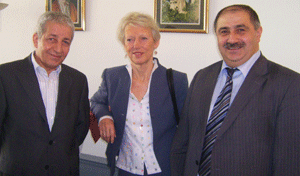Berlin: The City that Introduced Doner to the World
- Written by Admin TOA
- Published in Businessman
Berlin, Germany – Some day when the history of döner is written, Berlin will undoubtedly have a special place and significance. Döner, after its introduction in Turkey, put its name on the map first in Europe’s Berlin. Berlin ranks as the European city with the highest Turkish population—a group that tops 200,000—and its district of Kreuzberg was the first place in Germany that gave Germans a taste of doner.

Remzi Kaplan, President of Kaplan Doner.
On November 9, 1989, with the fall of the 46 km long wall that had been erected by the decision of the Eeastern German Parliament made on August 12, 1961 in an attempt to prevent the flight of East German citizens to West Germany, Berlin began to be the host for new events.
Remzi Kaplan is one of the businessmen who discovered East Berlin after the fall of the wall. Kaplan, who started out in trade by selling chickpeas and lentils in neighborhood markets in Ankara, began to sell döner from a two-wheeled cart in East Berlin in 1989. The first day he sold 15 kilos of döner. Sales increased day by day and reached 200 kilos per day.
When the quality of döner being produced in the factory began to deteriorate, Kaplan had to start his own production business. He began to produce döner under the trade name Kaplan Döner in a 250 square meter facility in 1990; as he puts it, “Even though I had no idea about how to make it.”
Other döner producers who felt that they could snap at a chance in the East Berlin market followed Kaplan. In a short while 35 other döner producers showed up in the market. While there were few döner producers and sellers in Berlin until 1996, now there are 41 döner facilities and close to 3000 stalls. At the present the greatest number of döner facilities in Europe are found in Berlin, Hamburg being second with 12 producers.
Kaplan says that their company is one of the three companies that have played a significant role in introducing döner to European countries other than Germany. The other two are Karmez, owned by Tütünbaşı brothers, which has its main office in Frankfurt, and Birtat, owned by Ali Hatay, which has been in business since 1998 in Waiblingen in Southeastern Germany.
Kaplan, who owns three plants in Berlin, Hanover, and Hamburg remarks: “In Europe döner was born in Berlin and from there spread to other countries of the world.” He tells us that he is the first döner entrepreneur who introduced it to the Dutch and Polish markets.

Kaplan with Heide- Knake Werner, the minister for social policy in the Berlin State government.
Kaplan, who employs a total of 165 people in his three plants, exports to 12 countries in the European Union. The businessman Kaplan remarks that they are attempting to maintain certain standards in döner production and sales and so they plan to require sale certificates in order to ensure that the sales are conducted under sanitary conditions. According to Kaplan: “We will no longer allow döner sellers to sell it with a cigarette in hand.” The 48-year-old Kaplan has a son and two daughters who are all in döner business.
MEAT SCANDALS AND VICTIMS
One event that frequently causes the German media and the döner producers to butt heads is the identification of tainted meat sales by döner producers. The tainted meat found in German Bruner company in Johanneskirchen near Munich in 2006 once more brought the German media and the döner producers up against one another. Bruner, which sold the spoiled meat to many companies in Europe that produce meat products, had pasted new labels over labels with expired dates.
At the time, the Society of European Turkish Döner Producers published a statement in which they criticised the association of tainted meat with döner and the accusations directed towards döner producers for what was the fault of wholesale dealers.
In 2006, 100 tons of tainted meat, a part of a total of 450 tons of tainted meat imported to Germany, was confiscated in the Bruner company, but the rest could not be found at all. Based on supposition, döner facilities were raided under authority obtained from the prosecutor and one company accused of buying tainted meat turned out to be Kaplan Döner, who had to present all its invoices for the dates between June 1-October 21, 2006. Remzi Kaplan says: “I offered to present German authorities with invoices not merely from June on, but from January 2006.”
The court case, the final hearing of which was to take place in May 2008, has stirred a great deal of interest in Germany. Kaplan describes the event with the following words: “On the day of the trial eight live TV broadcasters, five radio and 36 news reporters were waiting in the hall. As if a serial killer had been caught...I thought that if there was such an antagonistic campaign before the hearing, it should be expected to be much worse afterwards, and with my lawyer we decided not to go to the hearing,” So, Kaplan was fined 40,000 Euro for not attending the hearing.
Kaplan disputed the decision and filed an appeal. He comments: “We were awarded the Gold Medal in 2004, 2005 and 2006 for the döner we produced. I would not jeopardize my own name and the trade name of the company by buying 4 tons of tainted meat. I never produce or sell anything which I, myself, and my family do not eat.”
Last modified onSaturday, 06 May 2017 10:07
Latest from Admin TOA
- World Energy Council Türkiye Holds the Opening Meeting of the Young Energy Leaders (YEL’26) Program
- The Shared Pulse by Eda Uzunkara
- NEO HUMAN 10.0: How Will the Future Be Shaped? (Filiz Dag)
- Calculatit.net Is Bringing Pricing Transparency to America’s Construction Industry
- Support Independent, Trustworthy Journalism








